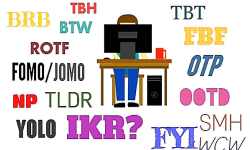
Emojis are internet slang communicated through pictures and emotions.
Mom: Your great aunt just passed away. LOL.
Peter: Why is that funny?
Mom: It’s not funny Peter! What do you mean?
Peter: Mom lol means laughing out loud!
Mom: Oh, My Goodness!! I sent that to everyone I thought it meant lots of love. I have to call everyone back, oh god.
I came across this chat in the internet recently which made me write this blog.
Internet lingo is a new language with creative and novel characteristics. It’s not that language is changing rapidly, but technologies have developed and they permit the transmission of slang terms to pass from one group to another much more quickly. As communication on the Internet is usually casual and informal, there are numerous slang words.
Internet trends come and go. The fast pace of change on the internet means we’re adopting further words quickly than ever. The internet has sped up the process of changes so you notice them more sharply. The question of how language spreads has enthralled linguists and anthropologists for many years.
On the website, there are generally two types of Internet English. The first is Formal Internet English. This is used in formal internet situations like important meetings. The alternate type of Internet English is Informal Internet English. Since most of our informal communication moment happens online, the Internet has developed its own language. This language is indeed more casual and has numerous abbreviations and acronyms.
Before you dive into the world of Informal Internet English, remember that there are abundant unambiguous and swearwords in Internet slang. Occasionally words are misspelled or used inaptly. Several words people use online are not used in face-to- face communication. So, learn this side of English only for online use!
The language changes nearly every day, as adages, images and videos go viral. When you bid someone farewell, you generally just say “ goodbye.” This is shortened to “bye” to save time since the word “ goodbye” is so common.
These are some of the most generally used Internet abbreviations;

- lol — laughing out loud
- brb — be right back
- g2g – got to go
- IRL- In real life
- TL;DR or TLDR – too long, didn’t read
- OMG – Oh my God!
- ROFL – rolling on the floor laughing
- 121 – One– to- one
Hashtags use the # symbol before the keywords, which are written without spaces. The hashtag has expanded into the rest of the Internet and not only found on Twitter now.
Example: #TBT, which stands for Throwback Thursday.
A Direct Message or DM, is a term used in the social media for private communication with someone.
The AMA was first made popular on the sharing forum and community, Reddit. Short for “ Ask Me Anything”. An AMA is when someone, generally from a well-known background, goes online and answers questions posed by the community.
The word “ meme” has been around longer than on the Internet. A meme is an image, textbook, or videotape that’s copied and modified over and over again. People add their funny changes to the image or textbook.
Ha … ha…
This is exactly what it looks like — 😂! Since you can’t see others when they type, “ haha” is a good way to show that you’re joking, or found it funny.
Example: My cat is trying to fit inside the cereal box, hahaha!
Types of Internet Slang Terms
- Letter Homophones
It’s one of the most common types of internet dialect which is composed of a group of letters taken from the original features of the words of the expression. Ex: ‘CU’-the letter c for the word “ see,” u for the word “ you.”
- Onomatopoeia
It’s another popular type of slang that involves the association of words with their associated sound. Example: Hahaha and Woof Woof
- Heterography
It makes use of a spelling that’s different from standard operation which generally comprises a combination of figures and letters. E.g. 2day or 2moro
The advantages of cyber slang are:
- It helps people express their feeling accessibly and compactly.
- New words and terms are being accepted due to its universal use. E.g. (the word “ netizen” is now used to relate to people who laboriously use the internet)
- It lowers the task of formal speech or writing.
- It produces new meanings for the existing words.
Whereas the disadvantages are
- First, it creates a hurdle to communication for the unexperienced.
- Since the internet slang is short, favouring one-syllable words, it leads to clichés, rather than the use of more precise words and originality.
- It doesn’t help to enhance the vocabulary of an individual.
- Not everyone understands the slang.
- Cyber slang creates a whole new type of grammar which is not accepted for academic purposes.
In short, although using slang isn’t bad, people shouldn’t use it abundantly, to avoid being ungracious in communication. I hope this article wasn’t TLTR (Too lengthy to read). 😉


This the trend among the Next-Gen and among the Millennial. A well written article.
Thanks a lot, Binoj
Excellent article portraying the transitioning of English language from proper to improper but acceptable by the modern generation ,LOL
Thanks a ton Jaya chechi